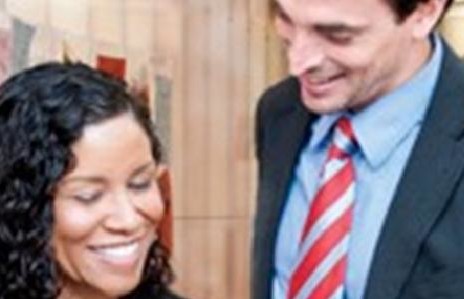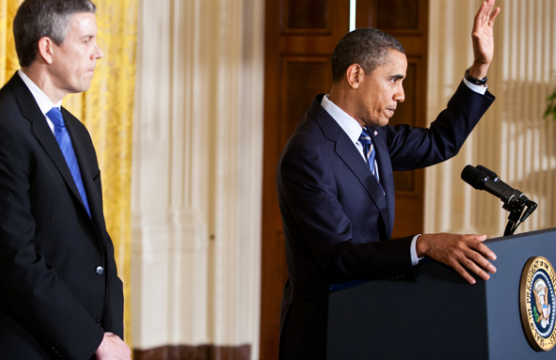
Programas pioneros del liderazgo escolar
View in english Nos complace compartir con Uds. la edición No. 37 de la Serie Mejores Prácticas, “Formación de liderazgo escolar: programas pioneros en Estados Unidos”.
Un panel de alto nivel de expertos lanzó un informe esta semana a través del Consejo Nacional para la Acreditación de la Formación Docente (NCATE), el cual sugiere que los programas de formación dedocentes en los EEUU sean “invertidos”, cambiando de programas tradicionales de formación de docentes a programas de práctica clínica, incluyendo mayor experiencia en aulas y evaluaciones frente estudiantes. El informe, titulado “Trasformando la Formación de Docentes Tras la Práctica Clínica” se basa, en parte, en seis informes temáticos que marcan la logística y teoría detrás de las propuestas del informe. El artículo (al fondo) del Wall Street Journal resume los hallazgos del informe y algunas reacciones.
Es probable que la propuesta tenga mucho apoyo popular, y por lo menos ocho estados han anunciado sus planes para implementar las recomendaciones del informe a nivel de políticas públicas. Sin embargo, Rick Hess escribió un blog provocativo en EducationNext que acusa al informe de falta de evidencia. “No vi mucha evidencia en este informe… No pude encontrar nada en el informe que explicara que, si la práctica clínica es la clave, tendría entonces sentido sacar a las universidades (tradicionales) de la fórmula de formación…” y “después de todo, la escuela ‘normal’ y programas de formación de docentes son innovaciones del siglo XIX; ¿no es posible que un repaso ‘radical’ del siglo XXI pueda evitar una dependencia de esa maquinaria?”
Aunque es improbable que surja evidencia válida para apoyar la práctica clínica para todos los estudiantes de la docencia, hoy en día existe apoyo casi universal para la reforma de la formación de docentes, incluyendo apoyo de los sindicatos nacionales (líderes de la AFT y NEA formaron parte del panel). Este informe, esté en lo correcto o no en identificar la práctica clínica como el ingrediente faltante para el éxito de jóvenes docentes, atrae la atención de alto nivel necesaria hacia el tema. La pregunta clave, como sugiere Hess, será si las propuestas representan simplemente “la sabiduría convencional del momento” o si serán las catalizadoras para los cambios deseados en la profesión docente, y a su vez, en el aprendizaje estudiantil.
Haga clic en «Lea más» abajo para leer el artículo completo del Wall Street Journal.
A panel of education experts has called for an overhaul of U.S. teacher-preparation programs, including a greater emphasis on classroom training as well as tougher admission and graduation standards for those hoping to teach in elementary and secondary classrooms.
The panel’s sweeping recommendations, released Tuesday, urge teacher-training programs to operate more like medical schools, which rely heavily on clinical experience.
Teacher candidates should spend more time in classrooms learning to teach—and proving that they can boost student achievement—before they earn a license to teach kindergarten through twelfth grade, the panel said.
«We need large, bold, systemic changes,» said James Cibulka, president of the National Council for the Accreditation of Teacher Education, the group that convened the expert panel. «As a nation, we are expecting all of our students to perform at high levels, so it follows that we need to expect more of our teachers as they enter the classroom.»
The panel said local school districts should work more closely with higher-education officials to train student teachers and assess whether they are actually helping students learn. In most states, candidates spend only about 10 to 12 weeks observing teachers or student-teaching themselves, with the bulk of their time spent listening to college lectures.
The nation’s colleges of education are a patchwork of programs which vary in quality. Each state sets its own admissions, graduation and licensing requirements, and teacher candidates aren’t required to graduate from nationally accredited programs.
As evidence has mounted that teacher quality is the biggest in-school determinant of student achievement, the programs have come under fire. In addition to a lack of real-life classroom training, critics have said the programs have lax admissions standards.
Studies have shown that, historically, students who enter teacher-education programs generally have lower grade-point averages or lower scores on college-entrance examinations than students who enter other professions.
The panel report didn’t recommend specific admissions standards, leaving that to individual states and schools. But it said teacher-preparation programs needed to increase their standards to «improve the candidate pool.»
Sharon Porter Robinson, president of the American Association of Colleges of Teacher Education, said many states had ratcheted up admissions standards, but more work was necessary.
«We need to become a more competitive career choice and we need to tap into a much wider span of the talent pool,» said Ms. Robinson, who praised the panel’s recommendations.
The panel, convened 10 months ago, includes representatives from higher education, K-12 school districts, teachers unions and state boards of education. It doesn’t have the authority to institute the recommendations, but has persuaded higher-education and K-12 school officials in California, Colorado, Louisiana, Maryland, New York, Ohio, Oregon and Tennessee to begin trying some of the recommendations in pilot programs.
The panel report also pushes for a tougher accreditation process, saying the current system isn’t rigorous enough and that it gives stamps of approval to weak programs. Studies have shown that teacher-education graduates take state licensing exams that often aren’t very challenging.
Mr. Cibulka’s teacher-accreditation group, for example, turned down only two of the roughly 100 programs that applied for accreditation this year.
Mr. Cibulka vowed in an interview to raise accrediting standards and to revoke accreditation from schools that fall short.
Arthur Levine, the former president of Teachers College at Columbia University who issued a highly critical report on teacher-preparation programs in 2006, said the recommendations were a good start.
«The key here isn’t the words in the report, it’s whether this report ends up on a shelf somewhere or is enacted,» said Mr. Levine, who served on the panel and is president of the Woodrow Wilson National Fellowship Foundation of Princeton, N.J. «It’s much easier to write a report than to put it into action.»
View in english Nos complace compartir con Uds. la edición No. 37 de la Serie Mejores Prácticas, “Formación de liderazgo escolar: programas pioneros en Estados Unidos”.
El pasado viernes, el Presidente Obama concedió más flexibilidad a los estados que están luchando para cumplir con los requerimientos de la ley “No Child Left Behind” (Que ningún niño se quede atrás, NCLB), la cual ha guiado las políticas educacionales de los Estados Unidos desde su aprobación en 2002.
Los Estados Unidos no va por buen camino en sus esfuerzos para mejorar considerablemente su sistema educativo, según un nuevo informe del National Center on Education and the Economy (Centro Nacional de Educación y la Economía). El estudio compara las políticas de EE.UU. a las de naciones exitosas y que…

